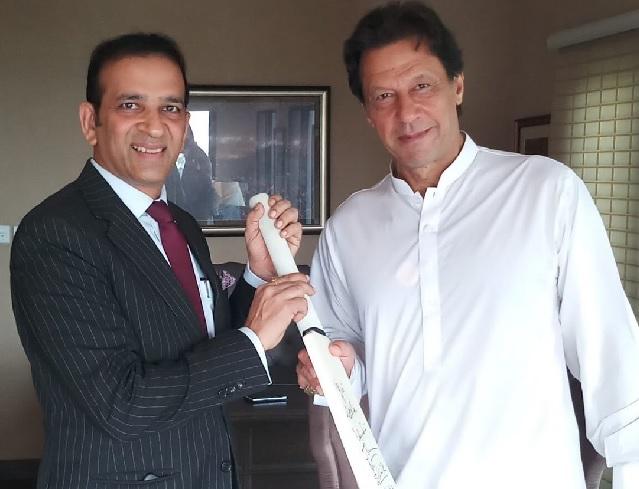Imran Khan and the future of India–Pakistan relations
Posted By Mohammed Ayoob on August 14, 2018 @ 14:30

Imran Khan, cricketer turned politician, will take the oath of office as prime minister of Pakistan on 18 August. Strategic analysts in South Asia and elsewhere have been busy speculating about what this means for the future of India–Pakistan relations, around which much of the international politics of the region revolves. Journalists, scholars and former diplomats, especially in India, have carefully dissected Imran’s statements about the future of India–Pakistan relations and his views on Kashmir and terrorism to discern if a change in Pakistan’s policy towards India is in the offing.
Much of this is a wasted exercise because it’s based on the false assumption that the prime minister determines Pakistan’s security and foreign policy, including its policy on India. Historical evidence demonstrates that these domains are the exclusive preserve of the military high command.
When the army chief, General Pervez Musharraf, launched the incursions into Indian Kashmir that led to the Kargil war in 1999, the prime minister, Nawaz Sharif, was, by his own admission, kept completely in the dark [1]. In fact, Sharif contended that he knew nothing of the operation and only learned of it from India’s prime minister, Atal Behari Vajpayee.
It’s interesting to note that Pakistan’s army brass approved the infiltration into Indian territory less than five weeks before the historic Lahore Declaration of 21 February 1999, signed by Sharif and Vajpayee during the latter’s goodwill visit to Pakistan. In some ways, that accord marked the highest point in the process of an emerging détente between the two countries in the wake of the nuclear tests both had conducted in 1998.
In hindsight, it’s obvious that the military leadership, aware of Vajpayee’s impending visit, wanted to derail the process. The civilian leadership was informed only in May 1999 when the Indians had detected the incursion and had begun to take retaliatory measures. In a related development, Sharif was removed from office in a coup staged by Musharraf [2] in October 1999.
Hostility towards India is ingrained in the Pakistani military top brass and a part of the army’s institutional memory. No civilian leader with the best of intentions can change this outlook. At best, he or she may try to work around it without ruffling too many feathers in the General Headquarters. A main reason for the military’s hostility towards Sharif was that, in his latest term in office, he once again attempted to deviate from the military’s prescriptions on security issues.
What the military resented most was Sharif’s relatively soft line on India, his bonhomie with Prime Minister Narendra Modi, and his repeated calls for the Pakistani extremists involved in the terrorist attack on Mumbai in November 2008 to be brought to justice by the Pakistani courts. In particular, his comment in May 2018 [3]—‘Militant organisations are active [in Pakistan]. Call them non-state actors, should we allow them to cross the border and kill 150 people in Mumbai?’—greatly irked the military.
We should have no illusions that Imran Khan will be in a position to change course on India–Pakistan relations unless the generals approve. He was the military’s chosen candidate for the job of prime minister, as events leading up to the elections made evident. Sharif and several other leaders of the ruling Pakistan Muslim League (Nawaz) were either disqualified or incarcerated to prevent them from participating in the elections. Others were coerced to join Khan’s party.
Opposition stalwarts lost seats in their strongholds, casting doubt on the fairness of the elections. Above all, the slow pace with which election results were declared indicated that the Election Commission had to wait for the ‘deep state’ to approve the results before announcing them.
Khan, former playboy turned born-again Muslim, is the military’s man par excellence. However, to ensure his compliance with the GHQ’s wishes, the military brass made sure that his party won’t receive a clear majority of seats in the new parliament. He is, therefore, dependent upon independents and smaller parties, which are very amenable to the military’s pressure, to form a governing coalition. The GHQ can always pull the plug on him by ordering these elements to withdraw support if he veers from the course set for him on relations with India.
All this doesn’t leave much hope that the central axis of South Asian international politics will undergo a fundamental, or even marginal, transformation under Pakistan’s new leader. The high degree of jingoism about and hostility towards Pakistan prevalent in Indian ruling circles and the media under the Hindu nationalist Bharatiya Janata Party government feeds the Pakistani establishment’s antagonism towards its larger neighbour.
Khan, dependent as he is on the military’s support to stay in office, is in no position to make a dent in this cycle of hostility and resentment.
Article printed from The Strategist: https://aspistrategist.ru
URL to article: /imran-khan-and-the-future-of-india-pakistan-relations/
URLs in this post:
[1] kept completely in the dark: https://www.hindustantimes.com/world-news/nawaz-sharif-was-unaware-of-pakistan-army-s-infiltration-of-kargil/story-5pyYhfSxlWVdWhLlNEfx4M.html
[2] a coup staged by Musharraf: https://www.nytimes.com/1999/10/13/world/coup-pakistan-overview-pakistan-army-seizes-power-hours-after-prime-minister.html
[3] comment in May 2018: https://timesofindia.indiatimes.com/world/pakistan/nawaz-sharif-admits-pakistan-played-a-role-in-26/11-mumbai-terror-attacks/articleshow/64137414.cms
Click here to print.